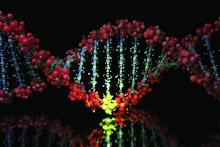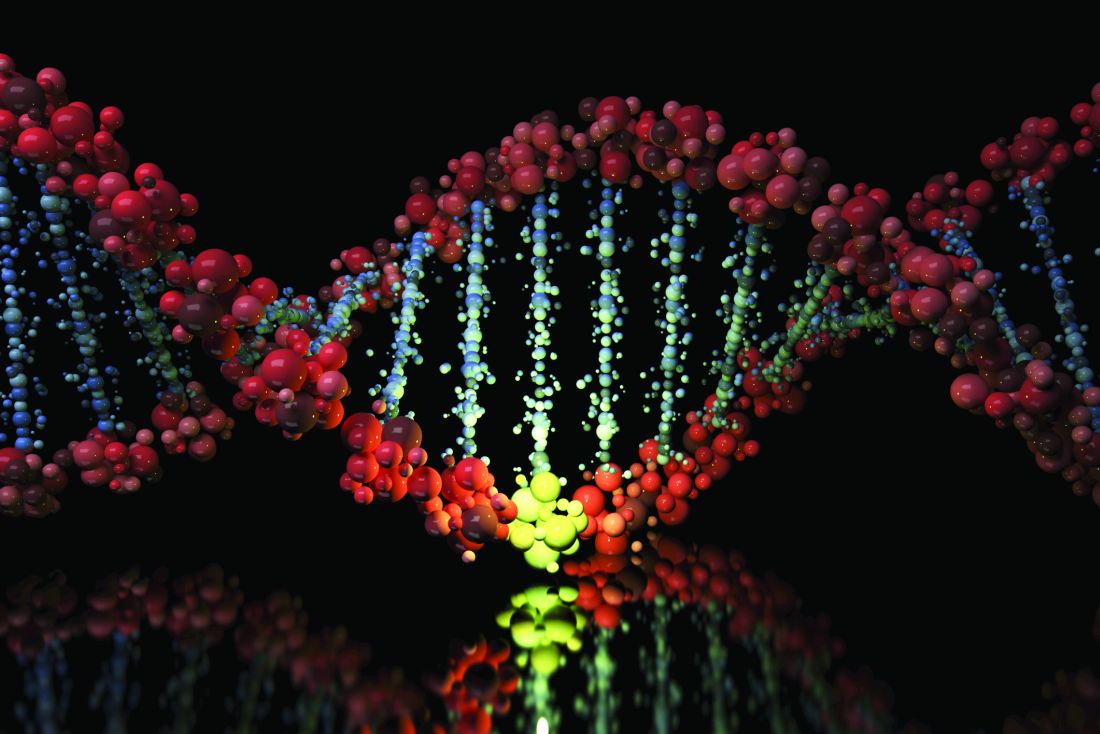User login
A new large study has identified 78 significantly mutated genes (SMGs) and has enlarged the genetic landscape of prostate cancer. In addition, 37 genes that were not previously reported as SMGs in prostate cancer and 23 that were not previously identified as recurrently altered in cancer, were identified.
“Through aggregation and uniform genomic analysis, we refined the map of somatic mutations in prostate cancer and identified cancer genes and pathways not previously associated with this disease,” said lead author Dr. Joshua Armenia, of the Memorial Sloan Kettering Cancer Center, New York.
“Our findings may inform patient stratification and translational investigation,” Dr. Armenia said in a press briefing held in 2017 genitourinary cancers symposium sponsored by the American Society of Clinical Oncology, ASTRO, and the Society of Urologic Oncology.
The mutational landscapes of primary and metastatic prostate cancer have been robustly analyzed in multiple whole exome sequencing (WES) studies.
But prostate cancer is a very heterogenous disease, explained Dr. Armenia. Aggregation and uniform genomic analysis of larger cohorts can reveal significantly mutated genes and pathways in the “long tail” (1%-5% of cases).
The power to detect genes is significantly proportional to the number of samples used, and the size of the cohort. “Our knowledge of prostate cancer genes is incomplete,” said Dr. Armenia.
He and his colleagues hypothesized that an aggregate, uniform analysis of all data generated to date would enable discovery of new significantly mutated genes and pathways not previously associated with prostate cancer and shed more light onto the genetic differences between primary and metastatic prostate cancer.
They analyzed 918 tumors, with a total of 583 primary tumors and 335 metastasis, with a mutational significance analysis that uses statistical and biological approaches to determine which genes and pathways are recurrently altered.
This approach led to the identification of 78 SMGs, and 37 of the genes are novel prostate cancer genes implicated in other tumor types; SPEN, SETD2, ARID1A, CUL3 ARID2, SMARCAD1, U2AF1.
“These genes have never been implicated in prostate cancer but are found in other tumor types,” said Dr. Armenia. “We stratified them by pathway, and we found 21% of the tumors show mutations in epigenetic regulators and chromatin remodelers.”
The investigators found that 14% of these tumors show alterations in the ubiquitin pathway in prostate cancer. The novel mutations in CUL3 (M299R hotspot) are mutually exclusive with SPOP mutations.
“Unexpectedly, we also found alterations in splicing pathway alterations in prostate cancer,” Dr. Armenia noted.
There were 38 altered tumors (4% of the 918 total) that had alterations in genes such as U2AF1 (0.5%) and SF3B1 (1%), GEMINS (0.8%), TCERG1 (1.3%), and PRPFB (1.3%).
The researchers found another “interesting” gene, SPEN, which is a novel prostate cancer gene. It is a hormone regulator gene that has been described in breast cancer, where it is associated with tamoxifen resistance. Truncating mutations were found in SPEN, which is a hormone inducible transcriptional repressor, in 2.8% of samples which is a rate similar to the frequency observed in breast tumors. SPEN in prostate cancer may have a similar role to the one it has in breast cancer.
“We performed enrichment analysis of genomic alterations in metastatic tumors to be able to identify markers of advanced disease,” he explained. “And what we found that TP53, AR, PTEN, FOXA1, APC, and BRCA2 alterations are enriched in metastatic samples.”
Alterations in epigenetic regulators (KMT2C, KMT2D) are significantly enriched in metastatic tumors while SPOP mutations and FOXP1/RYBP deletions are enriched in primary tumors.
Dr. Armenia and colleagues also identified a subclass of epigenetically mutated prostate cancer, representing 21% of prostate cancers and insignificantly enriched tumors lacking an ETS fusion.
“We discovered novel pathways in prostate cancer including SW1/SNF and splicing, as well as novel prostate cancer genes that include CUL3 and SPEN, and a set of genomic markers enriched in advanced disease,” he concluded.
A new large study has identified 78 significantly mutated genes (SMGs) and has enlarged the genetic landscape of prostate cancer. In addition, 37 genes that were not previously reported as SMGs in prostate cancer and 23 that were not previously identified as recurrently altered in cancer, were identified.
“Through aggregation and uniform genomic analysis, we refined the map of somatic mutations in prostate cancer and identified cancer genes and pathways not previously associated with this disease,” said lead author Dr. Joshua Armenia, of the Memorial Sloan Kettering Cancer Center, New York.
“Our findings may inform patient stratification and translational investigation,” Dr. Armenia said in a press briefing held in 2017 genitourinary cancers symposium sponsored by the American Society of Clinical Oncology, ASTRO, and the Society of Urologic Oncology.
The mutational landscapes of primary and metastatic prostate cancer have been robustly analyzed in multiple whole exome sequencing (WES) studies.
But prostate cancer is a very heterogenous disease, explained Dr. Armenia. Aggregation and uniform genomic analysis of larger cohorts can reveal significantly mutated genes and pathways in the “long tail” (1%-5% of cases).
The power to detect genes is significantly proportional to the number of samples used, and the size of the cohort. “Our knowledge of prostate cancer genes is incomplete,” said Dr. Armenia.
He and his colleagues hypothesized that an aggregate, uniform analysis of all data generated to date would enable discovery of new significantly mutated genes and pathways not previously associated with prostate cancer and shed more light onto the genetic differences between primary and metastatic prostate cancer.
They analyzed 918 tumors, with a total of 583 primary tumors and 335 metastasis, with a mutational significance analysis that uses statistical and biological approaches to determine which genes and pathways are recurrently altered.
This approach led to the identification of 78 SMGs, and 37 of the genes are novel prostate cancer genes implicated in other tumor types; SPEN, SETD2, ARID1A, CUL3 ARID2, SMARCAD1, U2AF1.
“These genes have never been implicated in prostate cancer but are found in other tumor types,” said Dr. Armenia. “We stratified them by pathway, and we found 21% of the tumors show mutations in epigenetic regulators and chromatin remodelers.”
The investigators found that 14% of these tumors show alterations in the ubiquitin pathway in prostate cancer. The novel mutations in CUL3 (M299R hotspot) are mutually exclusive with SPOP mutations.
“Unexpectedly, we also found alterations in splicing pathway alterations in prostate cancer,” Dr. Armenia noted.
There were 38 altered tumors (4% of the 918 total) that had alterations in genes such as U2AF1 (0.5%) and SF3B1 (1%), GEMINS (0.8%), TCERG1 (1.3%), and PRPFB (1.3%).
The researchers found another “interesting” gene, SPEN, which is a novel prostate cancer gene. It is a hormone regulator gene that has been described in breast cancer, where it is associated with tamoxifen resistance. Truncating mutations were found in SPEN, which is a hormone inducible transcriptional repressor, in 2.8% of samples which is a rate similar to the frequency observed in breast tumors. SPEN in prostate cancer may have a similar role to the one it has in breast cancer.
“We performed enrichment analysis of genomic alterations in metastatic tumors to be able to identify markers of advanced disease,” he explained. “And what we found that TP53, AR, PTEN, FOXA1, APC, and BRCA2 alterations are enriched in metastatic samples.”
Alterations in epigenetic regulators (KMT2C, KMT2D) are significantly enriched in metastatic tumors while SPOP mutations and FOXP1/RYBP deletions are enriched in primary tumors.
Dr. Armenia and colleagues also identified a subclass of epigenetically mutated prostate cancer, representing 21% of prostate cancers and insignificantly enriched tumors lacking an ETS fusion.
“We discovered novel pathways in prostate cancer including SW1/SNF and splicing, as well as novel prostate cancer genes that include CUL3 and SPEN, and a set of genomic markers enriched in advanced disease,” he concluded.
A new large study has identified 78 significantly mutated genes (SMGs) and has enlarged the genetic landscape of prostate cancer. In addition, 37 genes that were not previously reported as SMGs in prostate cancer and 23 that were not previously identified as recurrently altered in cancer, were identified.
“Through aggregation and uniform genomic analysis, we refined the map of somatic mutations in prostate cancer and identified cancer genes and pathways not previously associated with this disease,” said lead author Dr. Joshua Armenia, of the Memorial Sloan Kettering Cancer Center, New York.
“Our findings may inform patient stratification and translational investigation,” Dr. Armenia said in a press briefing held in 2017 genitourinary cancers symposium sponsored by the American Society of Clinical Oncology, ASTRO, and the Society of Urologic Oncology.
The mutational landscapes of primary and metastatic prostate cancer have been robustly analyzed in multiple whole exome sequencing (WES) studies.
But prostate cancer is a very heterogenous disease, explained Dr. Armenia. Aggregation and uniform genomic analysis of larger cohorts can reveal significantly mutated genes and pathways in the “long tail” (1%-5% of cases).
The power to detect genes is significantly proportional to the number of samples used, and the size of the cohort. “Our knowledge of prostate cancer genes is incomplete,” said Dr. Armenia.
He and his colleagues hypothesized that an aggregate, uniform analysis of all data generated to date would enable discovery of new significantly mutated genes and pathways not previously associated with prostate cancer and shed more light onto the genetic differences between primary and metastatic prostate cancer.
They analyzed 918 tumors, with a total of 583 primary tumors and 335 metastasis, with a mutational significance analysis that uses statistical and biological approaches to determine which genes and pathways are recurrently altered.
This approach led to the identification of 78 SMGs, and 37 of the genes are novel prostate cancer genes implicated in other tumor types; SPEN, SETD2, ARID1A, CUL3 ARID2, SMARCAD1, U2AF1.
“These genes have never been implicated in prostate cancer but are found in other tumor types,” said Dr. Armenia. “We stratified them by pathway, and we found 21% of the tumors show mutations in epigenetic regulators and chromatin remodelers.”
The investigators found that 14% of these tumors show alterations in the ubiquitin pathway in prostate cancer. The novel mutations in CUL3 (M299R hotspot) are mutually exclusive with SPOP mutations.
“Unexpectedly, we also found alterations in splicing pathway alterations in prostate cancer,” Dr. Armenia noted.
There were 38 altered tumors (4% of the 918 total) that had alterations in genes such as U2AF1 (0.5%) and SF3B1 (1%), GEMINS (0.8%), TCERG1 (1.3%), and PRPFB (1.3%).
The researchers found another “interesting” gene, SPEN, which is a novel prostate cancer gene. It is a hormone regulator gene that has been described in breast cancer, where it is associated with tamoxifen resistance. Truncating mutations were found in SPEN, which is a hormone inducible transcriptional repressor, in 2.8% of samples which is a rate similar to the frequency observed in breast tumors. SPEN in prostate cancer may have a similar role to the one it has in breast cancer.
“We performed enrichment analysis of genomic alterations in metastatic tumors to be able to identify markers of advanced disease,” he explained. “And what we found that TP53, AR, PTEN, FOXA1, APC, and BRCA2 alterations are enriched in metastatic samples.”
Alterations in epigenetic regulators (KMT2C, KMT2D) are significantly enriched in metastatic tumors while SPOP mutations and FOXP1/RYBP deletions are enriched in primary tumors.
Dr. Armenia and colleagues also identified a subclass of epigenetically mutated prostate cancer, representing 21% of prostate cancers and insignificantly enriched tumors lacking an ETS fusion.
“We discovered novel pathways in prostate cancer including SW1/SNF and splicing, as well as novel prostate cancer genes that include CUL3 and SPEN, and a set of genomic markers enriched in advanced disease,” he concluded.
Key clinical point: New findings on prostate cancer genetics may help inform patient stratification and translational research.
Major finding: A total of 78 significantly mutated genes were identified in prostate cancer along with 37 genes that were not previously reported as significantly mutated.
Data source: An experimental study that analyzed 918 tumors obtained from prostate cancer patients.
Disclosures: The study does not list a funding source. Dr. Armenia has no disclosures but several coauthors report relationships with industry.

